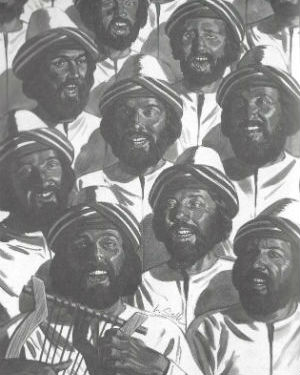The View from Our ‘Mt. Everest’ of Praise
or ‘All I Really Needed to Know Was in Psalm 103’
By Neil Earle
 King David the Psalmist appointed Levites to sing God's praises every day.
King David the Psalmist appointed Levites to sing God's praises every day.Back in the 1980s a mischievious author named Robert Fulghum wrote “All I Really Need to Know I Learned in Kindergarden,” a witty lay sermon to adults done as a reminiscience.
You might remember the points. According to Fulghum, teachers back there taught us…
Don’t hit people
Put things back where you found them
Wash your hands before you eat
Put things back where you found them
Pick up what you dropped
Flush
When you go out into the world, watch out for traffic, hold hands and stick together
Say you’re sorry when you hurt somebody
Warm cookies and cold milk are good for you…and so on
Fulghum’s “bait” was that all of this is still good advice, with expansion of course. kma’s Over the years I have found the same tribute could be paid to one of people’s favorite Psalms, Psalm 103, which has been described as “an Everest of Praise.”
Remember these words?
“Bless the Lord O my soul, and all that is within me bless his holy name.
Bless the Lord O my soul, and forget not all his benefits.”
Ironclad Promises…or Not?
Remember this whole Book of Psalms is the intensely emotional and worshipful section of Scripture rather than a source of doctrinal declarations for the Christian life. It’s like the difference between “The Star-Spangled Banner” and the American Constitution. Both are great writings on their own terms but serve different purposes and give off different atmospherics. We have to make allowances for the fact that an overly literal approach to Scripture can box us in to erroneous conclusions if we are not careful. For example, at the end of Psalm 103 “all his works” are enlisted to praise God as in Psalm 148:7-12 where whales and hailstorms, trees, rocks and birds are commanded to praise their Creator.These verses are not meant to be taken literally but interpreted poetically to depict in a colorful and creative way the fuller range of God‘s handiwork. In one sense the material elements can praise God, as when he sends a snowstorm to stop an arrogant army (Job 38:22-23) or stirs a whale-watcher to reflect on God’s many-folded power while filming the marvelous beasts.
“Poetic license” we call it today and it adds a surge of excitement to the inspired text.
Again, James 5 says the prayer of faith will save the sick but he is clearly decribing an overall pattern in the life of one who is blessed with miraculous healing – he is near death, calls for the elders and then is raised up. That is the ideal scenario and happens quite often in the Christian life but it is more descriptive of blessings received than a formula for avoiding suffering which we all have to endure (1 Peter 5:10). We have to be careful when applying Scripture that we not dictate to God how he will act.
Wise men tell us that the word “Bless” here can mean praise but praise taken up a notch, which means to praise with strong affection and gratitude. Scholar Derek Kidner titles this psalm “Admiring Gratitude” and that is the sense expressed right from the opening. Not just saying “Thank you” which is fine enough but calling upon one’s whole emotoion, spirit and body to praise God. There are 22 verses which make the Psalm an acrostic given that the Hebrew alphabet has 22 letters. So this is praise all right but, high-toned structured praise, worked through the poetic devices of rhythm, repetition and the highly exalted feeling we encounter in a Wordsworth or the high octane sections of Shakespeare.
Some have outlined the song in four main movements which might help us navigate it a little easier. These are:
1. Verse 1-5 as “an outburst of passionate praise for blessings received”
2. Verse 6-14 showing forth blessings given to the church, the people of God in both Testaments
3. Verses 15-18 stressing human weakness and God’s forgiveness
4. Verses 19-22 calling upon all creation to sing God’s praises
 Psalm 103 made an appearance in the 1970s movie which is still perfomed on stages across the country.
Psalm 103 made an appearance in the 1970s movie which is still perfomed on stages across the country.All God’s Benefits
“Forget not all his benefits” follows closely the dramatic opening exhortation to stir ourselves to praise God. “God’s benefits” – what a beautiful thought to open with in our stormy distracting times. This psalm is notewothy in that it doesn’t have a lot of requests to make. Rather it starts where all effective prayer begins – with thanksgiving. As the Cowboy Prayer has it, “Thank the good Lord you’re still above ground.”
But the very first benefit we have from God is obvious, or should be: “Who forgives all your iniquities, who heals all your diseases, who redeems your life from destruction” – yes, that’s all of us hearing these words. God has been with us. Upon repentance there is no more condemnation (Romans 8:1). What a priceless blessing to possess a healed conscience that allows us to face the future.
The phrase “he heals all your diseases” has been taken by some to mean God here makes an unbreakable promise to heal us. But while we may experience many remarkable healings along the way, the Psalm-writer King David himself found that though his sins were forgiven, the child born after the king’s sin of adultery was not healed (2 Samuel 12:15-23). How come? (See box.)
Language of the Heart
In the King James and New King James Versions Psalm 103:4 speaks of a God “who crowns you with loving kindness and tender mercies.”
Mark Twain said the difference between the right word and the wrong word is like the difference between lightning and a lightning bug.
Think of that phrase for a minute – “loving kindness” (Hesed in Hebrew) – what a beautiful word. The first man to translate a printed English Bible was William Tyndale and he was familiar with the Hebrew HESED. Many modern versions don’t use it. What a pity. Hesed means mercy, kindness, goodness, steadfast love. In the Old Testament it is employed two ways. It reveals God’s love for his people expressed in the very name he revealed to Moses, Yahweh, in fact this verse is a direct borrowing from God’s self-revelation in Exodus 34:5-7).
Pagan gods were strong and frightening and ugly but Israel’s God was so different. HESED shows his character. Loving kindness is linked here to “tender mercies” which in Hebrew is plural – RAHaMIM – related to rehem, “the Womb.” The link here to womb is expressive of deep compassion, of outflowing pity and of the personal, caring, deep heart of God. “Mother love” we might call it today.
Bible Dictionaries tell us that HESED and RAHaHIM are linked together as the operating concept behind the New Testament Greek word for grace, “CHARIS.” From charis we get Charity. And a lot more. Thus, the Bible in both Testaments speaks the language of the womb, the language of the heart. What a blessing.
Renewal!
Our text, Psalm 103:5 continues to focus on God’s loving activity on our behalf – “Who satisfies you with good things, so that your youth is renewed like the eagle’s.”
 Protective Mother Eagle – a symbol of longevity in ancient Israel.
Protective Mother Eagle – a symbol of longevity in ancient Israel.Some eagles renew their feathers every year and appear to outsiders to be new creatures. I like to call Psalm 103 the Eagle Psalm because it speaks of the eagle’s watchful care and especially the “moulting” or regrowing of its feathers. That’s a beautiful symbol of protection and transformation for us who feel too often like brooding doves.
With words God blesses us and with words we bless God. With praise we enter his gates, we are told elsewhere. Praise and thanksgiving usher us into God’s Presence. We stand with the writer of Psalm 103 and all God’s people past and present when, in an exalted sense, we join that immortal choir in heaven standing before the sea of glass (Revelation 14:1-5). And when we go to heaven in prayer we are reminded we are standing before the God of the universe, the God of all power. The God who can do anything. That is the key to our renewal – day by day. And that can get us through the week better than Alka-Seltzer.
God of Justice
That’s why the next verses of Psalm 103:6-8 remind us once more of the true God’s nature. It says: “The Lord executes righteousness and justice for all who are oppressed.”
Is this true? Is this happening now? Is God still on the job? Millions – no billions – don’t believe that. They look around and see oppression every night on the news and react in anger. But wait…God doesn’t see things as we see them. God is eternal. He has plenty of time. In time things work out. In time rain water breaks rocks. In time things change – mightily. I think of that here in my wife’s home in Memphis, Tennessee. Memphis is the home of the Lorraine Hotel where Martin Luther King, Jr. was murdered. Only, it’s not called the Lorraine Hotel any more. Today, it’s called the National Civil Rights Museum.
What a miracle of transformation. God’s justice works like that through the strange windings of history.
 Real Repentance, Unreal Mercy: King Manasseh was Judah's most evil king for 55 years yet found grace in the dungeon – see 2 Chronicles 33:16-20.
Real Repentance, Unreal Mercy: King Manasseh was Judah's most evil king for 55 years yet found grace in the dungeon – see 2 Chronicles 33:16-20.“Will God forgive me?”
Verses 10-14 renind us of God’s fatherly concern for us his creation. He does not reward us according to our sinful ways. His mercy is higher than heaven and as hard to encompass as the East is from the West. This means it is unlimited. “So far has he removed our transgressions from us.” Here is wonderful encouragment for people who wonder with the guilt that often throbs with the beating of their heart: Will God forgive me? Unequivocally Yes, because Psalm 103 says “as a father pities his children, so the Lord pities those who fear him.”
On that subject, that is all you need to remember. The Psalm repeats the language of the heart. “He knows our frame, he remembers that we are dust.” Above all things God is on the side of the wounded, repentant sinner. Jesus taught that we are to forgive each other 70 times 7. Is he any less merciful towards us? No, as verse 17 promises, “the mercy of the Lord is from everlasting to everlasting on those who fear him.”
Wise men and pastors have always understood this – there is no sin we have committed that can outreach God’s mercy towards us! Hear the words of America’s first theologian, Jonathan Edwards: “…the arms of mercy are open to embrace you. You need not be at all fearful of coming because of your sins, let them be ever so black. If you had as much guilt lying on each of your souls as all the wicked men in the world…if you come to God for mercy, sensible of your own vileness, and seeking pardon through the free mercy of God you would not need to be afraid. The greatness of your sins would be no impediment to your pardon…you need not bear that burden and distress any longer.”
And that is an eloquent demonstration of what Psalm 103 means to “fear God” (verse 17).
As if to confirm the true God’s ability to underwrite such precious life-giving declarations, Psalm 103 ends with a reminder of our God’s universe-reaching power, the God “who has established his throne in the heavens” (verse 19), Supreme Ruler of all that is, visible and invisible, both in his earthly dominion and among his angelic hosts.
The task before us is to keep reading, keep studying, to let God speak to us through these wonderful words we see in Psalm 103 and not to forget his benefits. Sometimes at times of death and tragedy and trapped in an awareness of sin we are often stunned, in shock. It’s hard to breathe, let alone speak. It is then we need other words to speak FOR us and on our behalf. That’s when the words of Psalm 103 – can speak FOR us. Truly, everything we need to learn is already in there!